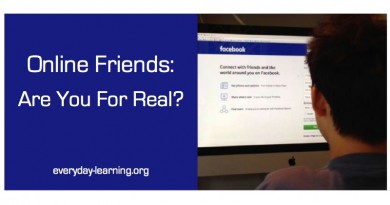Online Friends: The Great Equalizer

As a speech and language pathologist, I am always looking for ways to enhance the communication skills and socialization of the teens that I work with. Over the past five to ten years, I have found that special needs teens are beginning to form online friendships.
Online friendships formed through social networks are becoming the great “equalizer” according to disability advocates across the country. Online platforms such as Facebook, Instagram, Snapchat, Vine, and Twitter allow teens to nurture and maintain current friendships, as well as form new online friendships. In this environment, disabilities are neutralized and there is less opportunity for limitations to get in the way. For instance, teens who use assistive technology to communicate or are non-verbal can communicate freely with their peers through the use of computers and social media. Several special needs teens in my own community that I have the privilege to know are a large part of the local online social media teen presence. The benefits of extended social networks and access to peer support can significantly increase the socialization for many with special needs. Further, these sites allow them to post pictures of themselves which portray special needs teens in a positive light.
Social media formats like Facebook and Twitter allow you to join groups based on interest levels, hobbies, etc. This allows teens to feel “part of a group” which is good for self-esteem and socialization. It can also allow for teens to express themselves in a positive manner and share their knowledge on various topics.
In addition to social media platforms, children with special needs enjoy using email, texting and instant messaging (IM) to communicate with friends. These methods are harder for parents to monitor so it is important to make sure that your teen is ready for the responsibility of these methods of social communication. Texting and instant messaging (IM) even have their own coded “lingo” to keep parents out of the loop. ICYMI and you want to know what your teens are typing when PAW, check out NetLingo.
Online gaming also allows for social communication opportunities through the use of wi-fi. Gaming systems, such as Playstation 3, X-Box One and X-Box 360 as well as PC games, allow for personal messaging and chatting while playing directly with or against your friends. Online gaming allows you to meet random people to play against so parents should proceed with caution when allowing teens with special needs to play these types of games.
Skype, Google Hangouts, and FaceTime also allow teens to video chat with peers and extended family. Some of these video platforms offer the additional function of being able to instant message (IM) as well.
Just like any child that goes online, children with special needs need to be instructed and monitored while they are online to maintain their personal safety. A teen with learning or other cognitive disabilities may not recognize what type of information is not appropriate to share online. This does not mean that it is not safe for teens with special needs to be online; special precautions just need be taken to ensure and maintain safety. The level of functioning of your teen will help determine what type of precautions and limitations you may place on them.
- Encourage your child to be online friends with you and several other people that you trust so that they can help monitor your child online
- Talk about unsafe information to share online (Make a “Do Not Share List”)
- Talk about what information is “private”
- Teach online “rules” and “etiquette”
- Talk about formal and informal language use in social media (including emoticons)
- Talk about what is appropriate and inappropriate online behavior
- Talk about cyber-bullying and what it looks like
- Consider being linked to their account if necessary
- Set strict privacy settings when necessary
If monitored closely, social networking for special needs teens can be a very positive, rewarding and fulfilling experience. Communication skills can be enhanced and socialization expanded far beyond one’s backyard.
Does your special needs teen use social media?
How has it helped improve their social communication skills?




